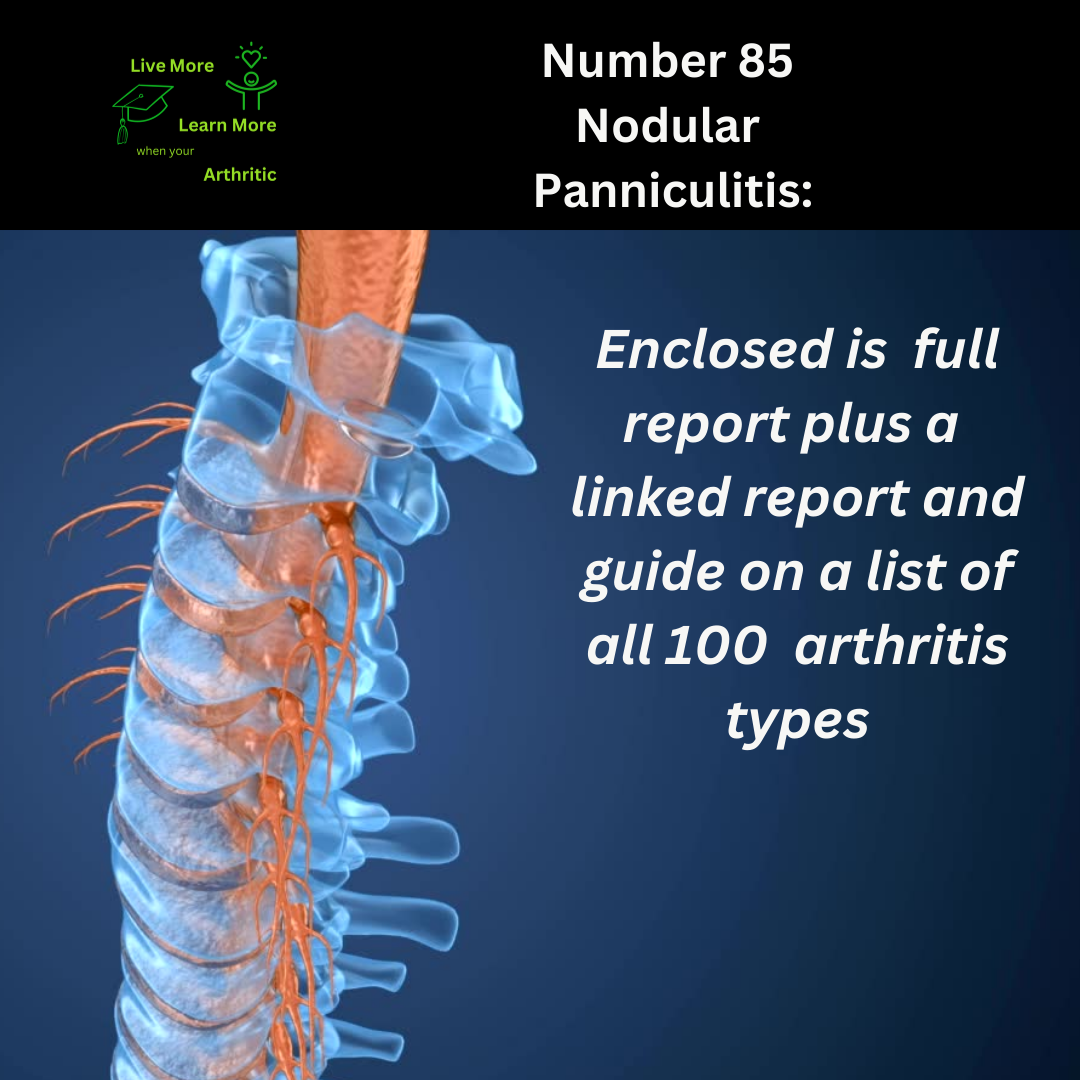
Nodular Panniculitis: Number 85 on the list of 100 types of Arthritis
Understanding Nodular Panniculitis: Unraveling the Mysteries
Nodular Panniculitis, though rare, is a condition that can have profound impacts on those affected. This disorder, characterized by inflammation of the fatty layer under the skin (panniculitis), presents challenges that require careful understanding and management.
 Nature of Remission and Disease Description
Nature of Remission and Disease Description
Achieving remission in Nodular Panniculitis varies depending on the specific subtype and severity of the condition. In some cases, with proper treatment and management, individuals can experience periods of reduced symptoms or even remission, where the inflammation subsides. However, the disease can be unpredictable, and ongoing monitoring is crucial.
Causes, Triggers, and Symptoms
The exact causes of Nodular Panniculitis are not fully understood, but it is believed to involve immune system dysfunction and inflammatory processes. Certain triggers, such as infections, medications, or autoimmune conditions, may exacerbate symptoms. Common symptoms include painful nodules under the skin, skin discoloration, and sometimes limited range of motion due to inflammation affecting nearby joints or tissues.
Onset and Lifespan Impact
Nodular Panniculitis can occur at any age, but it is more commonly diagnosed in adults. The impact on lifespan varies widely depending on disease severity and individual response to treatment. In severe cases, complications can affect organ function, potentially impacting longevity. However, with appropriate medical care and lifestyle adjustments, many individuals can lead fulfilling lives despite the challenges posed by the condition.
Autoimmune Arthritis and Quality of Life
While Nodular Panniculitis primarily affects the fatty layer under the skin, it can also lead to joint inflammation and limited mobility, resembling aspects of autoimmune arthritis. Proactive management, including physical therapy and tailored exercise programs, can significantly improve quality of life by maintaining joint function and overall mobility.
Complications and Associated Conditions
Complications of Nodular Panniculitis can include chronic pain, skin changes, and, in severe cases, systemic involvement affecting internal organs. Additionally, individuals with this condition may have an increased risk of developing other autoimmune disorders, such as lupus or rheumatoid arthritis, highlighting the importance of comprehensive medical care and ongoing monitoring.
Natural Breakthroughs and Health Advantages
While medication is often necessary to manage Nodular Panniculitis effectively, certain natural approaches can complement conventional treatments. For example, maintaining a healthy diet rich in anti-inflammatory foods and incorporating stress-reducing practices like yoga or meditation may help manage symptoms and improve overall well-being.
Epidemiology and Gender Disparities
Nodular Panniculitis affects both men and women, although some subtypes may have a slightly higher prevalence in one gender over the other. The condition is relatively rare, which underscores the need for specialized care and awareness among healthcare providers.
 Interconnected Health Concerns
Interconnected Health Concerns
Individuals with Nodular Panniculitis may be at increased risk of developing other autoimmune conditions due to shared underlying immune dysregulation. Conditions like systemic lupus erythematosus (SLE) or vasculitis may coexist, necessitating comprehensive evaluation and management by healthcare professionals with expertise in autoimmune diseases.
In conclusion, Nodular Panniculitis presents unique challenges that require a multidisciplinary approach to care. While the condition can impact various aspects of daily life, individuals can achieve a higher quality of life through proactive management strategies, including medical treatment, lifestyle modifications, and holistic approaches that support overall well-being. Ongoing research and advocacy efforts are essential for advancing our understanding of Nodular Panniculitis and improving outcomes for those affected by this complex disorder.

